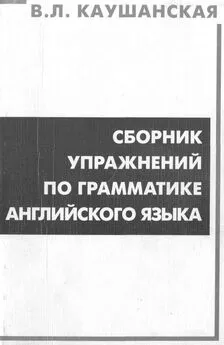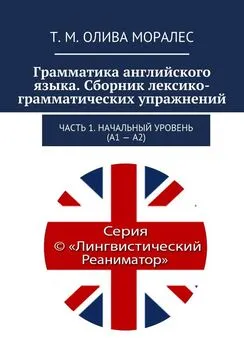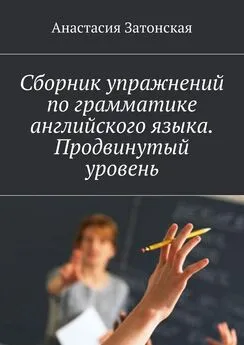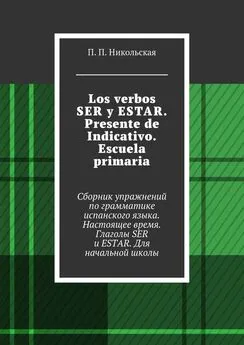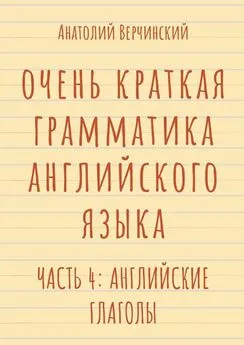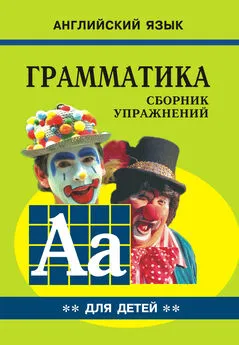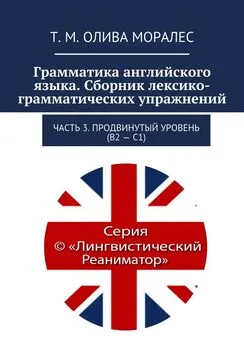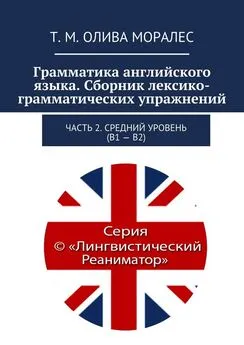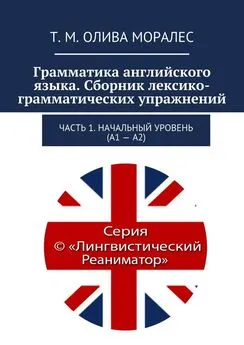В. Каушанская - Сборник упражнений по грамматике английского языка
- Название:Сборник упражнений по грамматике английского языка
- Автор:
- Жанр:
- Издательство:неизвестно
- Год:неизвестен
- ISBN:нет данных
- Рейтинг:
- Избранное:Добавить в избранное
-
Отзывы:
-
Ваша оценка:
В. Каушанская - Сборник упражнений по грамматике английского языка краткое содержание
Сборник упражнений по грамматике английского языка - читать онлайн бесплатно полную версию (весь текст целиком)
Интервал:
Закладка:
I. Утро было холодное и ветреное. 2. Был теплый летний вечер. 3. Настала ночь, и путешественники решили отдохнуть. 4. Он пишет с утра до ночи. 5. Он переночевал у приятеля. 6. Он провел бессонную ночь и был очень бледен. 7. Приятно поехать за город в ясный летний день. 8. И днем и ночью он думал об одном. 9. Было прекрасное утро — солнечное и тихое. 10. Было раннее утро, и все в доме еще спали.
Names of seasons.
1. It was __ winter, and __ night of bitter cold. (Wilde) 2. You see, __ winter was __ very bad time for me, and I really had no money at all to buy __ bread with. (Wilde) 3. It was __ very dark evening for __ summer. (E. Bronte) 4. __ summer drew to __ end, and __ early autumn. (E. Bronte) 5. I wondered if __ autumn would come upon us two months before her time. (Du Майrier) 6. ft was __ lovely evening in __ spring time of __ year; and in. __ soft stillness of __ twilight, all __ nature was very calm and beautiful. __ day had been fine and warm; but at __ coming on of __ night, __ air grew cool. (Dickens) 7. It was pretty late in __ autumn of __ year when __ declining sun, struggling through __ mist which had obscured it all day, looked brightly upon __ little Wiltshire village. (Dickens) 8. There was going to be __ election soon, we all knew: this was. __ spring of 1955. (Snow) 9. It was __ cold fall and __ wind came dowd from __ mountains. (Hemingway) 10. It was __ fine day, early in __ spring, and we were in __ good humour. (Maugham)
1. Была ранняя весна. 2. Была дождливая, холодная осень. 3. Осень была исключительно теплая; стояла ясная, солнечная погода. 4. Мое любимое время года — лето. 5. Лето 1941 года было очень жаркое.
Bed, school, prison, town.
1. It was eleven o'clock. Annette was still in __ bed. (Murdoch) 2. Stefan, who had been sitting on the edge of __ bed, came near to her and smiled for __ first time. (Murdoch) 3. May comb was __ old town. (Lee) 4. Dolores said nothing all __ way to __ town. (/. Shaw)5. Yes, he and my brother had been to __ school together. (Snow) 6. Before that she had taught history in __ girls' school. (Murdoch) 7. __ school was not __ particularly good one. (Conan Doyle) 8. I never knew __ lawyer yet who didn't threaten to put me in __ prison sooner or later. (Shaw) 9. Steger next visited __ county jail, close on to five o'clock, when it was already dark. (Dreiser) 10. In all probability he was already in — town. (Austen) 11. Among other public buildings in __ certain town... there is one anciently common to most towns, great or small... — __ workhouse. (Dickens) 12. After leaving __ school, I became clerk to her father. (Lindsay) 13. She graduated from __ Pedagogical Institute __ year ago and now she is working at __ school in __ village near Leningrad. 14. __ prison where Little Dorrit was born was called "The Marshalsea". 15. I haven't done anything that warrants my running away or going to __ prison, either. I'm merely going there to save time at __ present. (Dreiser) 16. It was in my walk that night, and in __ sleepless hours which followed when I lay in. __ bed, that __ thought first occurred to me which afterwards shaped itself into __ settled resolution* (Dickens) 17. He told with __ perfect truth... how he had in time been released from __ prison. (Dickens) 18. "When you think of me at all, John, let it only be as __ little child you have seen grow up in __ prison. (Dickens) 19. You take your man home, Mrs. Dubedut, and get him to __ bed before eleven. (Shaw)20. I'm going to be out of __ town for a few days. So I may not even see you again. (Faulkner) 21. Unless we can give __ rector. __ bed he had nowhere to lay his head this night. (Shaw) 22. Who could be in — _ prison __ quarter of __ century, and be prosperous! (Dickens)
1. Она легла спать в три часа и встала с головной болью. 2. Почему вы так поздно вернулись из города? 3. Женщина подошла к кровати и накрыла ребенка одеялом. 4. Она плохо себя чувствовала и провела весь день в постели. 5. Сегодня мне надо пойти в школу на родительское собрание. 6. Я провела все лето в городе. 7. Когда сестра окончила школу, она поступила в консерваторию. 8. Мы провели несколько дней в маленьком городке на Кавказе. 9. Мы живем на даче, но часто приезжаем в город. 10. О. Генри был обвинен в краже, и, хотя он был невиновен, его посадили в тюрьму. Он сидел в тюрьме три года.
Names of meals.
1. He said he had letters to write and if I would allow him, would remain in his room till __ dinner was ready. (Jerome K. Jerome) 2. He came in one morning when I was having — breakfast on __ terrace of __ hotel and introduced himself. (Maugham) 3. I saw to it that he had __ good dinner. (Jerome K. Jerome) 4. We had __ cold bacon for __ lunch that day. There was not much of it. I took it to be __ bacon we had not eaten for — breakfast. But on __ clean dish with parsley it looked rather neat. (Jerome K. Jerome) 5. Mr. Clay settled back in his chair, savoring his drink, expecting __ good dinner. (/. Shaw)6. __ dinner was very sound. (Bennett) 7. Come and have __ tea on __ deck. (Bennett) 8. They had __ supper in __ silence. (Murdoch) 9. __ little expedition down __ river was delightful, and __ little room overlooking __ river into which they were shown for __ dinner was delightful. (Dickens) 10. In __ tiny dining-room, we were having __ excellent dinner, cooked by Mary Osbaldiston-.. (Snow) 11. She... began to dress for __ dinner to which she had been invited. (Austen) 12. When he arrived... __ famous Contract was at __ dinner. (Dreiser) 13. When they arrived and mounted __, stairs, Stefan behaved as usual, and soon they were eating. __ supper which Jan had prepared. (Murdoch) 14. He assisted her... in setting forth __ neat luncheon, consisting of __ cold chicken, __ ham and __ tarts. (Ch. Bronte) 15. __ dinner was __ grand one. (Austen) 16. I shall be glad to see you at __ lunch at half past one. (Shaw) 17. He had given me __ dinner, and __ good one. (Snow)
I. Мы позавтракали в восемь часов. 2. Завтрак состоял из хлеба с маслом, сыра и кофе. 3. Не опаздывайте к обеду. 4. Обед еще не готов. 5. Наши знакомые пригласили нас на обед.
Most.
1. You have had __ most distinguished career... (Snow) 2. This was __ most painful thought of all. (Murdoch) 3. He had put himself in __ most unsatisfactory position, politically and socially. (Dreiser) 4. She was __ most beautiful young girl; __ most beautiful girl he had ever seen. (Bennett) 5. __ most of __ women had flowers or little black feathers sticking up in their hair. (Glyn) 6. I started relating __ most interesting anecdote, but was somewhat surprised to observe... that nobody was paying __ slightest attention io me whatever. (Jerome K. Jerome) 7. __ news he had conveyed to her would have terrified __ most women. (Cronin) 8. He was __ man of __ most subtle and refined intellect. __ man of __ culture, __. charm and __ distinction. One of __ most intellectual men I ever met. (Wilde) 9. Her life held so little of __ real charm; and Aileen Butler was __ most significant element of __ romance in it. (Dreiser) 10. Youth in her South Carolinian home had been simple and self-reliant; and unlike __ most American girls, she had not had too good __ time. (Galsworthy) 11. It was __ most beautiful room. It was _ most beautiful room in — house. (Du Maurier) 12. Gentleman, he was __ most excellent man, __ ' most gentle, tender and estimable man, with __ simplicity of __ child. (Dickens) 13. __ Norman Conquest is one of __ most important events in __ English history, and it had __ greatest influence on __ history of __ language.
Few, little.
1.. __ mother and I are planning to go to __ country for __ few days. (Dreiser) 2. It was __ cold, windy evening and there were __ few people in __ Park. 3. __ few words that I have to add to what 1 have written, are soon penned. (Dickens) 4. We needn't take. __ porter. We have __ little luggage. 5. When you've wanted something very badly and it comes at last, it is somehow __ little frightening. (Maugham) 6. __ little I have to say can be said in __ few minutes. 7. I am commonly __ man of __ few words. (Dickens) 8. One morning, when Rose was alone in __ breakfast-parlour, Harry Maylie entered; and, with some hesitation, begged __ permission to speak with her for __ few moments. (Dickens) 9. What __ little light there was came from one small window. (Priestley) 10. He paused, wishing he had not mentioned that fact. It was __ slip of __ tongue, one of __ few he ever made, due to __ peculiar pressure of __ situation. (Dreiser) 11. Oh, I know there's no danger, but I'm __ little frightened all __ same. (Greene) 12. Well, for instance, why don't you tell me about your sister? She always sounds fascinating, from __ little I hear, but I've no real idea what she's like. (Hansford Johnson) 13. __ old man replied that there were __ few grown persons as trustworthy or as careful as she [Nell]. (Dickens) 14. Harriet closed her coat quickly and walked __ little faster. (/. Shaw)15. We can't disguise from ourselves that there's __ little hope. (Greene) 16. He accepted willingly my invitation to remain for __ few days in my apartment. (Maugham) 17. I seem to have forgotten __ little I ever knew. (Conan Doyle) 18. He tried to orient himself by : __ stars; but it was __ cloudy night and __ few stars that were visible did not announce any constellation that he could recognize. (Murdoch) 19. Carie expostulated, begged, was very angry, even wept __ little, and then suddenly capitulated. (Buck) 20. Luf- kin's tastes were austere. He spent __ little on himself. (Snow) 21. I see very __ few women; but those are __ women of rank. (James) 22. Mary offered to lend __ little she had. (E. Bronte) 23. I've travelled __ little, but not enough. (Hansford Johnson) 24. Surely, during __ few hours he might pass in _ cottage it would be easy for her to keep out of his way. (Marryat) 25. She respected him mightily but gave him __ very little thought. (Buck) 26. When __ winter came... he suffered __ good deal from — cold and __ hunger, and often had to go to __ bed without any supper but __ few dried pears or some hard nuts. (Wilde) 27. He was one of __ few men of science who never terrified me, probably because he never behaved like __ doctor. (Lee)
Читать дальшеИнтервал:
Закладка:
